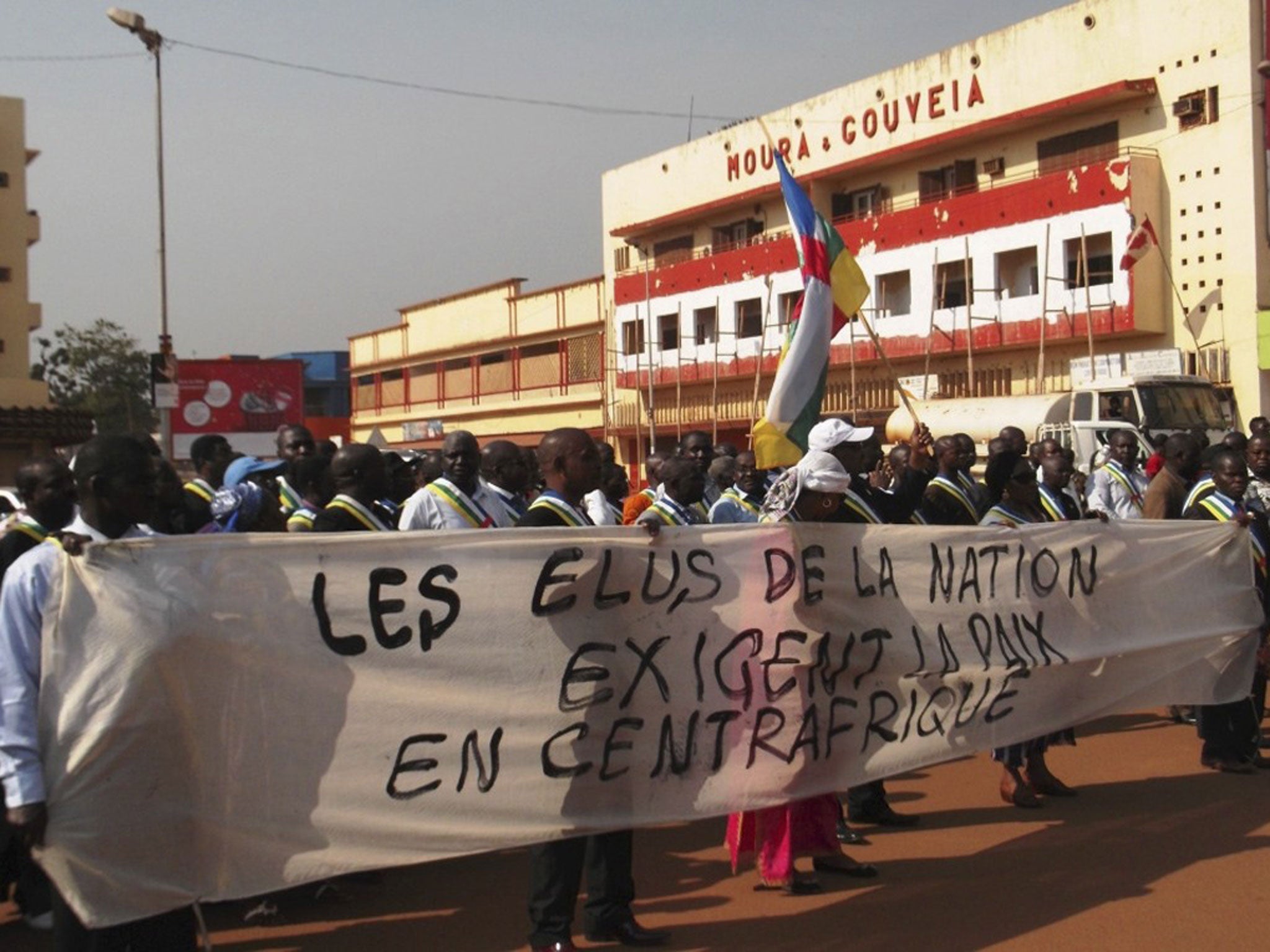Aid workers stay behind to protect rescued child soldiers
Advancing rebels are 45 miles from capital of Central African Republic


Your support helps us to tell the story
From reproductive rights to climate change to Big Tech, The Independent is on the ground when the story is developing. Whether it's investigating the financials of Elon Musk's pro-Trump PAC or producing our latest documentary, 'The A Word', which shines a light on the American women fighting for reproductive rights, we know how important it is to parse out the facts from the messaging.
At such a critical moment in US history, we need reporters on the ground. Your donation allows us to keep sending journalists to speak to both sides of the story.
The Independent is trusted by Americans across the entire political spectrum. And unlike many other quality news outlets, we choose not to lock Americans out of our reporting and analysis with paywalls. We believe quality journalism should be available to everyone, paid for by those who can afford it.
Your support makes all the difference.
Please donate to our appeal for child soldiers here.
The 64 former child soldiers rescued by the children’s charity Unicef, in work being funded by The Independent’s Christmas appeal, have been moved to a place of safety in the Central African Republic as rebel troops advanced to just 45 miles outside the capital Bangui.
Amid a deteriorating security situation, the United Nations has evacuated 200 expat staff and family members from the country. The United States also urged its nationals to leave.
Among the departing UN workers are a small number of Unicef staff who were temporarily evacuated to Yaoundé in neighbouring Cameroon on Boxing Day. But key Unicef aid workers have remained to protect and take care of the rescued child soldiers.
“Emergency activities in the Central African Republic are currently being managed by four senior staff who will receive support from other remaining Unicef workers,” said a Unicef UK spokesperson. The programme employs a significant proportion of local staff who, along with the senior international aid workers, will remain “in daily contact with national and local authorities to ensure the protection and well-being for these children”.
The country’s president Francois Bozize has appealed to the United States and the former colonial power, France, to intervene but the French president, François Hollande, indicated yesterday that the intervention of the 200 French troops stationed in the country will be restricted to protecting French nationals and interests. The nuclear energy group Areva mines uranium in the south of the country to power nuclear plants in France.
US Special Forces are in the country to help local forces track down the Lord’s Resistance Army, the brutal rebel group responsible for killing thousands of civilians across four African nations and for abducting many children as soldiers and sex slaves.
There is “no way” France would “intervene in the internal business of a country,” said Mr Hollande. “Those days are over.”
The children rescued by Unicef have been transferred to the organisation’s secure compound in Bangui. “A whole network of support is being provided there – doctors, supplies, psychosocial support etc, to ensure their wellbeing,” a Unicef spokesperson added. Aid workers in the capital say there are as yet few real consequences from the rebel offensive on life in the capital.
Rebel commanders have announced that they will not attempt to storm the city. One of them, Colonel Djouma Narkoyo, told Reuters by telephone: “For reasons of security and protection of civilians, we no longer consider it necessary to wage the battle for Bangui and to send our troops there as General Francois Bozize ... has already lost control of the country.”
That said, rebel commanders have previously broken promises to stop advancing in their attempts to overthrow President Bozize, who came to power in a 2003 rebellion. He has won two subsequent elections but has repeatedly relied on foreign intervention to fend off rebel attacks. Neighbouring Chad has troops in the country though they appear to have done little to stem the advance of the rebels who have taken several major towns in the north of the country.
While the government and rebels busy themselves with military and political manoeuvring, Unicef is exploring several options to transfer the rescued children from their emergency home in the Unicef compound to secure specialised residential centres. There the children will continue the delicate processes of psychological rehabilitation which must follow their physical demobilisation.
As soon as the security situation stabilises they will be returned to school or vocational training. Later they will be reunited with their families or resettled with foster carers as part of the extended Unicef programme to restore their stolen childhoods.
Click here to donate. Text CHILD to 70030 to donate five pounds. Click here to bid in our charity auction
Join our commenting forum
Join thought-provoking conversations, follow other Independent readers and see their replies
Comments